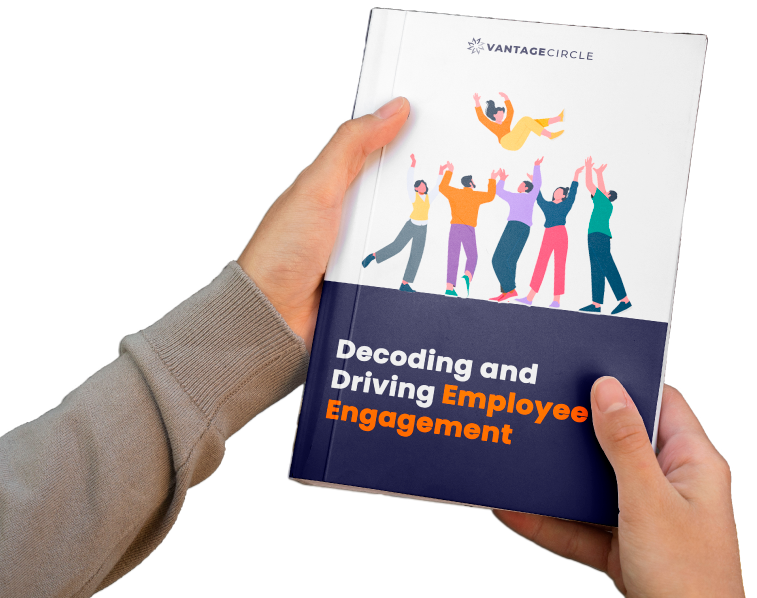Peer Relationships at work: How to improve, Examples and Importance

A Global Employee Recognition and Wellness Platform
Do you think only paychecks and rewards are enough to make your people happy? Well, no, at least not for everyone! To offer your employees meaningful and satisfying work experience, you need to create a sense of belonging in the workplace. Promoting positive peer relationships can make it possible.
However, peer relationships can be a challenge, especially in colossal organizations where competition is the need of the hour. But, without it, many organizations and teams flounder. So, in this article, let’s look at a broader view of peer relationships. Let’s find out your role in it and how you can systematically manage and support peer-to-peer relationships among your employees.
What are peer relationships at work?
Peer relationships at work refer to the interactions and connections employees have with their colleagues at similar levels within the organization. These relationships are crucial for creating a supportive and collaborative work environment. Key aspects of peer relationships at work include:
Collaboration: Working together on projects and tasks, sharing knowledge and resources.
Support: Offering help and encouragement, both professionally and personally.
Communication: Engaging in open and honest dialogue, providing constructive feedback, and actively listening.
Trust: Building mutual respect and reliability among colleagues.
Camaraderie: Developing friendships and a sense of belonging, which can enhance job satisfaction and morale.
Strong peer relationships can lead to increased teamwork, improved problem-solving, and a more positive workplace culture.
How to improve peer relationships at work
1. Peer Recognition

Peer to peer recognition is the most effective way to build relationships among coworkers in the workplace.
Employees complain about feeling undervalued and unappreciated as one of the main reasons for leaving their jobs. So, when you build a system where appreciation is not just from top-down but also among peers, the chances of turnover reduces.
When employees support and celebrate each other, it automatically boosts the group’s confidence and increases motivation among everyone. Team members feel recognized for the time, effort, and skills they are putting in to achieve their targets.
Practising gratitude will enable managers and coworkers to understand every individuals’ strengths and best qualities. It also makes employees feel valued at their work and a sense of belonging to their work culture.
However, employees work under tight schedules and deadlines. They might not always have the luxury of spending time recognizing their peers. Sometimes they might even forget about it amid other priority tasks.
Besides, finding the right words, composing a message, and delivering it in the right way might look like another pending task. Without a structured system, recognizing peers may also lack consistency.
To solve this issue, go for a tool that can make appreciating peers as easy as pie.
A survey revealed that 58% of employees would recognize and encourage their peers more often if given the right tools to make it easy.
Using a recognition system can help you ensure that appreciating peers is seamlessly integrated into the workflow.
To make recognition a recurring cultural norm, choose a tool that allows your employees-
-
To recognize their peers socially.
-
To appreciate their peers on the spot with fun, relatable badges and shoutouts for every work well done.
-
To form a heartfelt appreciation message with the correct choice of words without hassle.
-
To issue a bonus or award for coworkers (each month or quarter) as an act of recognition.

With such a system, you can make peer-to-peer recognition more frequent and widespread.
2. Organize social Events
If you have a traditional and hierarchy-heavy work culture, this point holds more importance for you. Social events like team lunches, volunteering for social work are some outing ideas that managers can initiate to strengthen relationships among employees.
Employees are more likely to be comfortable and share with their peers outside the workplace. Your employees can showcase their hidden talents, allow people to work in teams, share their common interests.
Social events encourage employees to connect beyond their task list and make time for small talk.
Especially if your teams are working remotely, coffee machine conversations or spontaneous chit-chats are not possible. Even when your remote employees meet virtually, conversations get straight to business.
Social events or team meet-ups open the floor for your employees to engage in more personal and meaningful conversations.
3. Collect feedback.

To help your people improve peer relationships, you must assess their present experiences. So, start with taking feedback from employees themselves.
Firstly, you can use the survey results to identify existing areas of positive peer interactions. Make sure to recognize and celebrate employees who consistently show behaviors that help in building healthy peer relationships.
This includes collaborators, supporters, mentors, and helpers. Go for a recognition tool that highlights these desired values. It will make the recognition process simpler and more effective.

Secondly, It will help you identify areas where employees may feel a lack of bond or connection with their peers. For instance, say the survey results reveal that limited collaboration opportunities make your employees feel disconnected.
You can then take the right steps to improve it. Such as- a spirit week celebration, cross-functional projects, or teaming up employees for projects.
But here's the catch. Your employees might hold back from sharing their unsolicited feedback fearing repercussions or negative reactions.

So, why not offer them the option to provide feedback anonymously if they prefer? It will make it easy for our teams to share their insights without any added stress.
4. Foster a culture of trust and clear Communication
Promote transparent communication to ensure all your employees are on the same page. It will minimize misunderstandings and conflicts in the workplace. At the same time, build trust among your people leading to positive peer relationships.
Here are a few actionable steps you can take to enhance communication in your workplace-
-
Build a culture of accountability
Recognize employees who demonstrate accountability in their actions and decision-making. Reward them for taking responsibility for their actions rather than making their peers take the flake.
-
Build a psychologically safe work environment:
Foster a culture where employees feel comfortable reaching out to coworkers for input or support. Create a work culture where employees can share their perspectives without fearing rejection or judgment.
-
Prioritize communication in every aspect:
Take inspiration from companies like Zappos. They emphasize building relationships and collaboration even in their core values.
"Build Open and Honest Relationships With Communication." is one of the 10 core values of Zappos. They also have happy hours and monthly social events where employees can relax and socialize outside of work.
Related: Want to take inspiration from a few other organizations' core values? Read these 10 Effective Company Core Values Examples.
5. Have the right policies in place.

Workplace policies can help you create and enhance a positive work environment. And we all know how crucial it is to maintain healthy peer relationships in the workplace.
Here are a few must-have policies if you want your employees to establish positive relationships with peers-
-
Create a conflict resolution policy. It will help you outline a clear process to address conflicts in an impartial, constructive, and respectful manner. At the same time, it will help you find mutually agreeable solutions.
-
Establish an anti-discrimination and harassment policy. Clear guidelines will help you stomp out any form of disrespectful behavior, discrimination, harassment, or bullying among your people.
-
Have a DEI policy. It will encourage employees to respect each other irrespective of their differences.
-
A fair and transparent performance management policy to avoid grudges among peers.
6. Establish mentor-mentee relationships:

This will work best if your employees are from different backgrounds and have varied levels of expertise.
Think about their your team's diverse skills and areas of expertise. Take stock of what each member brings to the table. Are they “sales superstars, communication gurus? coding masters? time management ninjas? or maybe a data analysis expert?
Now comes the fun part. Based on this evaluation, match what they can offer with what their coworkers would want to learn. Take, for instance, one of your employees Mark’s got a knack for project management. Pair him up with Sally, who always wanted to improve her project management skills.
This will allow you to the most of your team's existing resources. At the same time, employees will engage in discussions and learn from their peers. Leading to stronger relationships among each other.
It’s a win-win!
7. Foster cross-functional collaboration:

Encourage collaboration and teamwork across employees from different departments and teams.
For instance, you can pair employees from your software and hardware teams to work on a new product. Working together to find solutions to common challenges will foster camaraderie and team spirit.
Thus, leading to better peer relationships in the long run.
8. Maintain Boundaries
While it is essential to deepen peer relationships, too much of it can hamper their productivity and performance.
Therefore, employees need to know how to manage their boundaries. It doesn’t mean that people should stop interacting with other employees. Maintaining boundaries means being mindful of whom you let into your physical and psychological space.
Peers differ in their needs, beliefs, values, knowledge and expertise. Getting too deep into anyone’s space can lead to a difference in opinions which can cause conflicts among employees.
9. Soft Skills Training Sessions

To exist in a space harmoniously with people completely different from you, you need good social skills. Or what we call soft skills.
Soft skills are personal attributes that enable someone to interact effectively and harmoniously with other people.
These skills play a key role in our daily operations. Therefore, for employees who spend more than 8 hours together for 5 days a week, having soft skills is very important. Soft skills enhance interactions, boost job performance and also help in advancing one’s career.
Conduct soft skills training sessions so employees can work on their communication skills, learn how to cooperate and collaborate. Train them to become better problem solvers, make better decisions, learn to manage time and other skills.
10. Team Building Activities

I have mentioned this point separately from social events because team building activities have a completely different approach from team lunches and picnics.
Conduct team-building activities to enable employees to acquire new skills and hone their existing skill-set. They can take on skills like effective problem-solving, coming up with innovative ideas as a team, and making decisions after considering everyone's opinions. Other skills that can be learned are time management, clear and precise communication, leadership, and more.
11. Listen First
A very important point, always listen first and then respond. Half of the miscommunication and conflicts that arise will get resolved if people listen attentively.
When people talk and listen to each other, they can find out a lot about each other. They can understand each other's perspectives, improvise on ideas, and more.
12. Avoid Gossiping

Avoid gossiping at all costs. Such behavior gives rise to interpersonal conflicts and office politics.
If employees face issues with someone, ask them to talk directly with the person involved in the scenario instead of bad-mouthing him/her to others.
Gossiping with other employees will only put a strain on your relationship with the person involved. It will damage the trust that you have built and hinder future collaborations.
Peer relationships at work examples
Asking a colleague for help with a project:
When you're stuck on a particular aspect of a project, reaching out to a coworker for assistance can provide new insights and solutions. This fosters a sense of teamwork and collaboration, as colleagues rely on each other's expertise to achieve common goals.
Sharing a laugh with a coworker during a break:
Taking a break to chat and share a laugh with a coworker can relieve stress and build stronger personal connections. These informal interactions contribute to a positive work environment and enhance overall job satisfaction.
Brainstorming ideas together:
Collaborating with peers to brainstorm ideas for a project or solve a problem encourages creativity and diverse thinking. This collective effort often leads to more innovative and effective solutions than working alone.
Offering moral support to a colleague who is facing a deadline:
Providing encouragement and reassurance to a coworker under pressure shows empathy and builds trust. Whether it's helping with tasks or simply listening, moral support strengthens peer relationships and promotes a supportive work culture.
Celebrating a team accomplishment:
Recognizing and celebrating successes with your peers, such as completing a project or achieving a milestone, boosts morale and reinforces a sense of camaraderie. Celebrations can range from a simple acknowledgment in a meeting to a team lunch or small party.
These examples demonstrate how peer relationships at work involve various forms of interaction, support, and collaboration. Building and maintaining strong peer relationships can lead to a more cohesive, motivated, and productive team.
Why do peer relationships at work matter
Strong peer relationships significantly impact your work experience and the success of the organization. Here are some reasons why they matter:
Increased productivity and performance: When you enjoy working with your colleagues, you're more likely to be motivated and engaged in your work.
Improved job satisfaction: Positive relationships with your peers can make your job more enjoyable and fulfilling.
Stronger support system: A good support network at work can help you manage stress and navigate challenges.
Enhanced creativity and problem-solving: Collaboration with diverse perspectives leads to better ideas and solutions.
Reduced workplace conflict: Strong peer relationships can help prevent misunderstandings and disagreements.
Increased employee retention: Employees who feel valued and supported by their peers are more likely to stay with the company.
Wrapping Up
Ever since early childhood, we have had the need and desire to connect and bond with others. It’s not any difference in the workplace. Your employees spend so much time together. It’s only natural that they would want to make connections and bonds during this time.
An effective way to help employees achieve fulfillment is by increasing peer interactions in the workplace.

















